|
Dendropicos fuscescens (Cardinal
woodpecker)
Kardinaalspeg [Afrikaans]; Isinqolamthi (also applied to
Knysna woodpecker) [Xhosa]; iNqondaqonda [Zulu]; Mbangura (generic term for
woodpecker and also applied to Crested barbet) [Kwangali]; Kokomoru [South
Sotho]; Hohodza (generic name for woodpecker) [Shona]; Ghongoswana (generic term
for woodpecker) [Tsonga]; Kôkômere, Phaphadikôta [Tswana]; Kardinaalspecht
[Dutch]; Pic cardinal [French]; Kardinalspecht [German]; Pica-pau-cardeal
[Portuguese]
Life
> Eukaryotes >
Opisthokonta
> Metazoa (animals) >
Bilateria >
Deuterostomia > Chordata >
Craniata > Vertebrata (vertebrates) > Gnathostomata (jawed
vertebrates) > Teleostomi (teleost fish) > Osteichthyes (bony fish) > Class:
Sarcopterygii (lobe-finned
fish) > Stegocephalia (terrestrial
vertebrates) > Tetrapoda
(four-legged vertebrates) > Reptiliomorpha > Amniota >
Reptilia (reptiles) >
Romeriida > Diapsida > Archosauromorpha > Archosauria >
Dinosauria
(dinosaurs) > Saurischia > Theropoda (bipedal predatory dinosaurs) >
Coelurosauria > Maniraptora > Aves
(birds) >
Order: Piciformes
> Family: Picidae
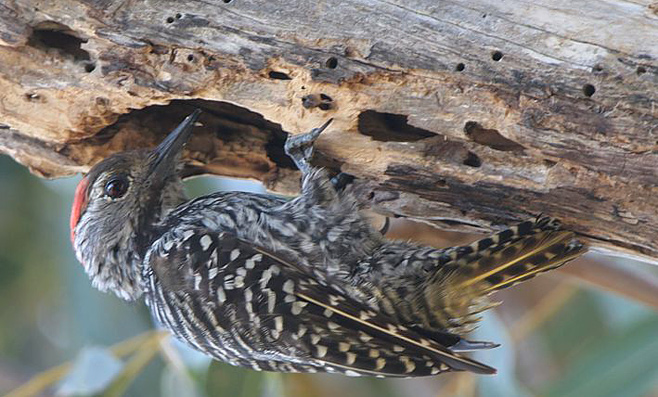 |
|
Cardinal woodpecker male, in the process of
excavating a tree cavity, West Coast National Park, South Africa. [photo Trevor Hardaker ©] |
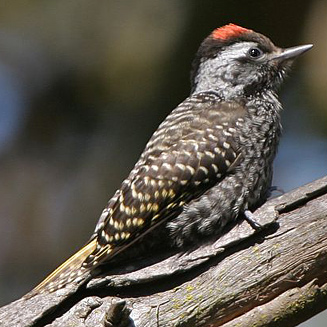 |
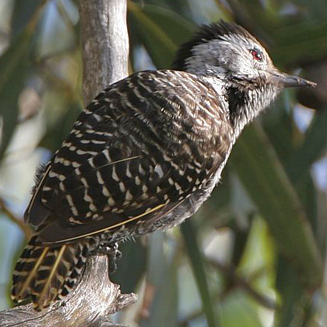 |
|
Cardinal woodpecker male, West Coast National
Park, South Africa. [photo Trevor Hardaker ©] |
Cardinal woodpecker female, West Coast National
Park, South Africa. [photo Trevor Hardaker ©] |
The Cardinal woodpecker is probably the most common and
widespread of all African arboreal woodpeckers, with a range extending across
sub-Saharan Africa. It is an extremely agile forager, gleaning ants and termites
from bark and leaves, breaking open seed pods and even feeding on fruit. Both
sexes excavate the nest, which is usually a hole in the underside of a tree
branch. Here it lays 1-3 eggs, which are incubated by both sexes for about 12-13
days. The chicks are cared for by both parents, eventually leaving the nest
after about 27 days. They become fully independent 1-2 months after fledging.
Distribution and habitat
It is probably the most common and widespread of all
African arboreal woodpeckers, occurring across most of Sub-Saharan Africa,
excluding dense equatorial lowland forest. It is most common in woodland and savanna, avoiding arid areas.
|
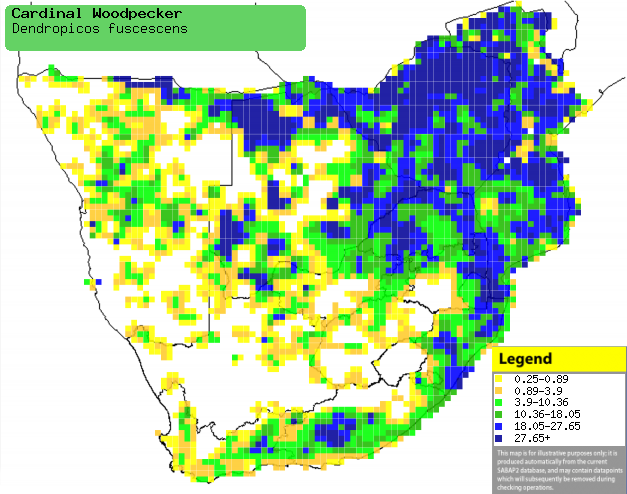 |
|
Distribution of Cardinal woodpecker in southern Africa,
based on statistical smoothing of the records from first SA Bird Atlas
Project (©
Animal Demography unit, University of
Cape Town; smoothing by Birgit Erni and Francesca Little). Colours range
from dark blue (most common) through to yellow (least common).
See here for the latest distribution
from the SABAP2. |
Brood parasites
It has been recorded as host of the
Scaly-throated honeyguide.
Food
It is an extremely agile forager, gleaning ants and
termites from bark and leaves, breaking open seed pods and occasionally feeding on fruit. The following food items have been recorded in
its diet:
- Invertebrates
- Plants
- fruit
- Uapaca kirkiana (Mahobohobo)
- seeds
- Combretum zeyheri (Large-bushwillow)
Breeding
- Both sexes excavate the nest, which is usually a hole in the underside of
a tree branch, although nesting in wooden fence posts has
also been recorded.
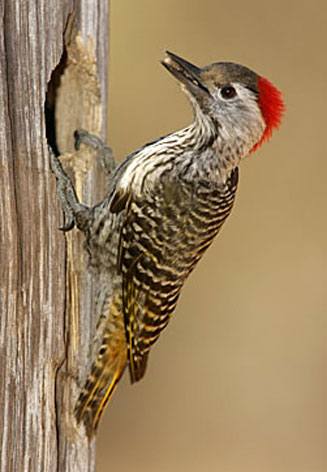 |
|
|
Cardinal woodpecker at its nest hollow, Settlers,
South Africa. [photo Warwick Tarboton ©] |
|
- Egg-laying season is from July-December, peaking from August-October.
- It lays 1-3 eggs, which are incubated by both sexes for about 12-13
days.
- The chicks are cared for by both parents, eventually leaving the nest
after about 27 days. They become fully independent 1-2 months after
fledging.
Threats
Not threatened, in fact widespread and common.
References
-
Hockey PAR, Dean WRJ and Ryan PG (eds) 2005. Roberts
- Birds of southern Africa, VIIth ed. The Trustees of the John Voelcker
Bird Book Fund, Cape Town.
|
